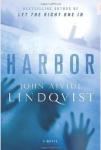Harbor
John Ajvide Lindqvist
Thomas Dunne Books
Hardcover, 512 pages, $25.99
Review by Sheila M. Merritt
Let the Right One In catapulted John Ajvide Lindqvist to the highest echelon of literary respect. He confirmed this exalted position with his next novel, Handling the Undead. Does his latest book, Harbor, solidify his rank as a master of horror fiction? In most ways, yes; but in this outing, Lindqvist doesn’t reach the pinnacles of success established by the earlier works. The overly long tome occasionally gets lost at sea, and flounders. Bearing the author’s trademark brilliant and insightful renderings of characterization and atmosphere, Harbor is quietly creepy “epic horror.” When the scares emerge, they are indeed excellent. There are lulls, however, that don’t quite tide the reader over; the ebb and flow of the narrative is erratic.
The premise is intriguing: A six-year-old wanders away from her parents in an isolated environment and disappears without a trace. The little girl seems to have vanished into thin air: The family had crossed a frozen body of water to visit an old lighthouse, and were the only people within miles when the child went missing, shortly after wandering off on her own. Two years later Anders, the father, remains a broken man; an unemployed alcoholic whose marriage dissolved after the mysterious occurrence. Returning to the island he left after the tragedy, the despondent fellow finds that there are links within the area’s history that hold clues to what happened to the kid. Complicity among the locals enshrouds the community in tight-lipped secrecy, regarding recurring odd events and a past rife with reprehensible deeds.
The sea, in a Scandinavian riff on aquatic Lovecraftian themes, makes demands on the populace. Bountiful herring meant sharing to the point of sacrifice, for the early dwellers of the isle. This Swedish spin on Shirley Jackson’s “The Lottery” is only a passing plot amplification; Lindqvist’s scope is much larger: “And then there was the other world. The one where Domarö lay in the arms of dark forces that held the island in an iron grip. Where you had to watch every step and be prepared to be torn away from relationships at any moment. So that not everything will disappear.” The emphasis of the tale is about the connection between the briny deep and the deeply bereaved. And there are numerous sad inhabitants of the island of Domarö.
The distressed denizens include: a woman who engages in psychotic plastic surgery as an aspect of self-mutilation; a magician who bears the gift and burden of supernatural attributes courtesy of a saliva-demanding-wormlike creature; as well as other residents, who have departed in unusual circumstances, and don’t rest in peace.
To cope, an adaptation process is necessary: “Like people in a war zone or a city under siege, they clung to the small elements of happiness that still exist in life.” For Elin, the physically scarred and damaged damsel, the besieged psyche is reflected in disfigurement: “Two deep grooves lined with livid scars ran from the outer edges of her nostrils down to the corners of her mouth. Beneath her eyes, which were now deep-set, were angry red patches criss-crossed by a number of thin lines that continued out towards her temples. She had her wrinkles emphasized. The operations she underwent had the opposite aim of normal plastic surgery. She was making herself older, cruder, uglier.”
A cosmic convergence of characters from different eras aids in the understanding of what must be addressed and combated. The narrative drifts back and forth in time, sometimes as given knowledge, but often as remembrances with subjective variance. As Anna-Greta, longtime resident and a central figure in the yarn, states: “We can never know anything about what has happened in the past, because it has been turned into stories. Even for those who are involved.”
For readers who become anchored in Harbor, the perceived ambiguities may abrade one’s perception of the plot. There is much psychic wear-and-tear in the fabric of the story and, at times, it gets in the way of propelling the tale. Certainly admirable for addressing a plethora of personages, and looking at sundry back stories, there are shifts in focus that disrupt. While nominally, Anders is the protagonist and his point of view is profoundly important, several other figures are also prominent. And some of them dispute Anders’ recollections; while not being too clear on their own observations. Obscurity is all well and good, but blurring too many lines can lead to dizziness.
John Ajvide Lindqvist soared to sensational heights with his first two books. The author’s reputation is retained in Harbor: in the ambiance, access to the inner workings of the characters’ minds, and perceptive dialogue. While not on a par with the previous novels, Lindqvist’s most recent U.S. release is still eloquent and engrossing.









